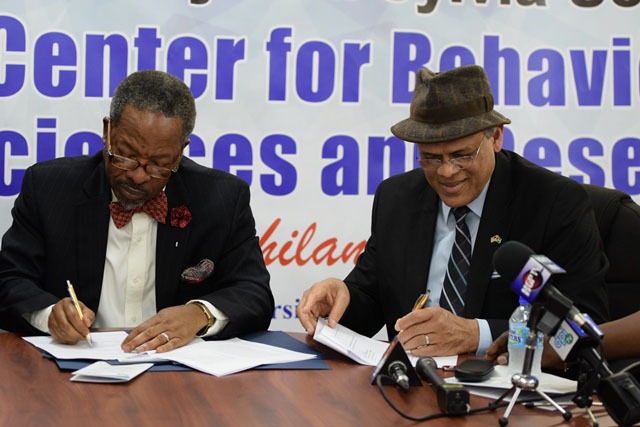The University of Guyana has signed an agreement with the US-based Jay and Sylvia Sobhraj Foundation to refurbish and convert the building that formerly housed the Spicy Dish restaurant into a state-of-the-art behavioural studies and research centre at a cost of US$400,000 or some $80 million.
Speaking yesterday at the signing ceremony held at the university’s Turkeyen campus, Deputy Vice Chancellor, Professor Paloma Mohamed said the funding “is the first major gift by a single individual or a foundation given to the university.”
In brief remarks Vice Chancellor Professor Ivelaw Griffith expressed his appreciation to the foundation for helping the university improve its facilities to ensure adequate teaching, and adequate social amenities for students and staff.
The multipurpose facility will be called the Jay and Sylvia Sobhraj Centre for Behavioural Studies and Research after the husband and wife who founded the foundation. The centre will accommodate the university’s psychology programme.
The programme began in March with the offer of a diploma in psychology and based on the completion of the facility, the undergraduate degree and master’s degree programmes are likely to be offered at the end of the year, Mohamed said.
In a brief background on how he got involved in giving back, cofounder and mechanical engineer Jairaj “Jay” Sobhraj said that he was fortunate to have gotten a British education from small grants, “a ten pound here and a ten pound there”, provided by foundations. In those days there were no students’ loans available to help him and his parents could not afford to pay the tuition fee for his university education.
Sobhraj who left Guyana in the 60s and studied in England, returned to work in the bauxite industry in 1975 and 1976. “I was a coward. You know the saying, ‘when you can’t stand the heat, get out of the kitchen. I couldn’t handle it.” He returned to England then moved to the Middle East where he worked on oil rigs for 12 years.
After he and his wife Sylvia, a nurse, formed the foundation, together with directors Nardeo Singh, information technology consultant and Sravan, an entrepreneur, they formed partnerships with several institutions in Guyana, including the Guyana Police Force and the Central Islamic Organisation of Guyana to which they have provided computer training.
On graduating, Sobhraj said, he had no loans to repay and he thanked God that today he can share what he received from others with people in his home country.
“Many Africans and Indians say that Africa and India is our motherland. That is our grandmother land. Guyana is our motherland. We have to take care of our own.”
Speaking of the gift, he said, “We are hoping that what we are doing here today will motivate others to do the same. There are many willing Guyanese in North America and Europe who want to do the same but they are not aware of how to go about doing it.”
The US$400,000 is the first major gift by a private individual or foundation negotiated under the office of the deputy vice chancellor – philanthropy, alumni and civic engagement (PACE).
The project had its origins at a social gathering hosted by Patrick Sooklall of Impressions who made the introductions between the university through Mohamed and the foundation about a year ago.
The design of the project is being done pro bono by UG alumnus/past lecturer and architect Sheldon Williams.
The project will include an upper floor that will house four soundproof lecture rooms, one state- -of-the-art classroom and one smart classroom that will accommodate from 30 to 100 students. It will also accommodate a boardroom for 30 people.
The lower floor will house a food court and lounge, campus store and bookstore, a students’ gym and a meeting room each for Christian, Hindu and Muslim students. It is expected that the refurbishment will be completed in time for the opening of the start of the semester in September.






